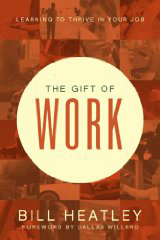The Gift of Work -> Chapter 2: Kingdom Living
 Training for kings.
Training for kings.
From the outside in… practicing habits of healthy living until proficient. From the inside out… becoming increasingly open to the involvement of God in the training process.
Such are the spiritual disciplines: twin and simultaneous trajectories toward becoming the kind of person you were meant to be.
 Reflecting on the workplace, it is my stewardship of the life God has given me that determines the character of my presence and contribution there. Hence the power of Heatley’s now obvious, but usually overlooked, linkage between our stewardship within God’s kingdom with the role of kings.
Reflecting on the workplace, it is my stewardship of the life God has given me that determines the character of my presence and contribution there. Hence the power of Heatley’s now obvious, but usually overlooked, linkage between our stewardship within God’s kingdom with the role of kings.
How I show up matters.
Whether or not I choose to engage fully—authentically, energetically and creatively—matters.
The choices I make at work improve, restore, and create; as well as harm, exploit, and destroy. The exercise of my “lordship” has real effects.
I‘m observing that my reflections are revolving around the impact this chapter is having on my own personal motivations for embracing the crucial and urgent value of practicing life over and over and then over again.
Instead of rote religiousity or mindless conformity, practicing the spiritual disciples becomes an exercise of powerful freedom and personal responsibility. I become more human, not less human, by preparing intentionally and diligently for the unknown choices that lie ahead.
Read along and join the discussion. What was your main take-away from Chapter 2?







March 16th, 2009 at 10:29 am
Key takeaways from Chapter 2: our “lordship,” and using disciplines to shape our lordship at work. We’ve already seen the importance of spiritual disciplines for Heatley: he’s learned well from Dallas Willard and Richard Foster. “Work” has not been a place where I’ve considered practicing disciplines. So it’s enormously useful that Heatley plugs in his “Practice” sections every several pages. It makes the book practical! And surely that is a large part of the point: in our work we seek to be practical, so our spiritual discipleship should inform our work no less than our worship.
Our “lordship” comes in where we choose to bring practical consequences of faith to work. Heatley suggests that we exercise influence (lordship) to one degree or another, actively or passively. So why not deliberately choose to allow our spiritual life to inform our work life? Again, how practical! Insofar as we do not bring faith to work, we are making a determined decision. This point is one I’m grateful to Heatley for making: it’s all too easy to passively separate work and faith.
For the Christian, of course, Christ should be the center of every aspect of life. Although Heatley hasn’t used the word yet, it is true to say that for a Christian to leave his or her faith outside the realm of work is a kind of idolatry. But that conceptual framework — true as it may be — might remain entirely theoretical, if it were not for that recurring theme of discipline. The tree shall be judged by its fruit, after all!
March 18th, 2009 at 3:10 pm
T.E. Brown,
You might even say, “Given that the tree shall be judged by its fruit, what all goes into growing a healthy, fruit-bearing tree?” In other words, let’s begin with the practical fact, the lived reality before we start talking about the principles and concepts behind it. Any talking amongst ourselves should serve the purpose of helping us make a practical decision, our next lived choice.
Hence the value of practices that develop and hone our capacity to make good choices. It matters less to me that I be able to look back on my choices and judge them good ones. I want to become a certain sort of person. The sort of person who, no matter what life throws at him, makes choices, the outcome of which benefit others.